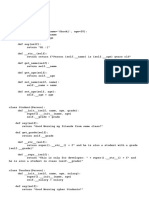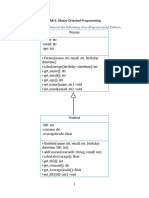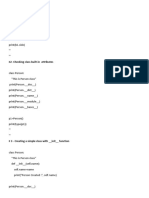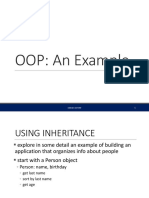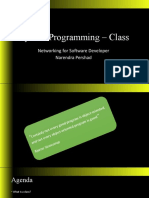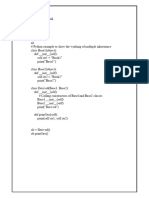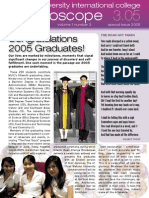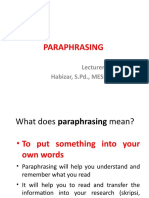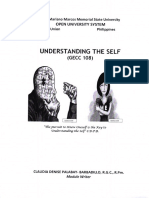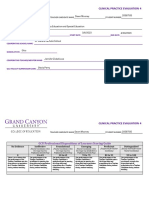MIT OpenCourseWare
http://ocw.mit.edu
6.00 Introduction to Computer Science and Programming
Fall 2008
For information about citing these materials or our Terms of Use, visit: http://ocw.mit.edu/terms.
�6.00 Handout, Lecture 16
Not intended to make sense outside of lecture
class Person(object):
def __init__(self, family_name, first_name):
self.family_name = family_name
self.first_name = first_name
def familyName(self):
return self.family_name
def firstName(self):
return self.first_name
def __cmp__(self, other):
return cmp((self.family_name, self.first_name),
(other.family_name, other.first_name))
def __str__(self):
return '<Person: %s %s>'%(self.first_name, self.family_name)
def say(self,toWhom,something):
return self.first_name + ' ' + self.family_name + ' says to ' +
toWhom.firstName() + ' ' + toWhom.familyName() + ': ' + something
def sing(self,toWhom,something):
return self.say(toWhom,something + ' tra la la')
class MITPerson(Person):
nextIdNum = 0
def __init__(self, familyName, firstName):
Person.__init__(self, familyName, firstName)
self.idNum = MITPerson.nextIdNum
MITPerson.nextIdNum += 1
def getIdNum(self):
return self.idNum
def __str__(self):
return '<MIT Person: %s %s>'%(self.first_name, self.family_name)
def __cmp__(self,other):
return cmp(self.idNum, other.idNum)
##p1 = MITPerson('Smith','Fred')
##p2 = MITPerson('Foobar','Jane')
##print p1.getIdNum()
##print p2.getIdNum()
class UG(MITPerson):
def __init__(self, familyName, firstName):
MITPerson.__init__(self, familyName, firstName)
self.year = None
def setYear(self, year):
if year > 5: raise OverflowError('Too many')
self.year = year
def getYear(self):
return self.year
def say(self,toWhom,something):
return MITPerson.say(self,toWhom,'Excuse me, but ' + something)
##
##me = Person("Grimson", "Eric")
##ug = UG('Doe', 'Jane')
class Prof(MITPerson):
def __init__(self, familyName, firstName, rank):
MITPerson.__init__(self, familyName, firstName)
self.rank = rank
self.teaching = {}
def addTeaching(self, term, subj):
�try:
self.teaching[term].append(subj)
except KeyError:
self.teaching[term] = [subj]
def getTeaching(self, term):
try:
return self.teaching[term]
except KeyError:
return None
def lecture(self,toWhom,something):
return self.say(toWhom,something + ' as it is obvious')
def say(self,toWhom,something):
if type(toWhom) == UG:
return MITPerson.say(self,toWhom,'I do not understand why you say ' +
something)
elif type(toWhom) == Prof:
return MITPerson.say(self,toWhom,'I really liked your paper on ' +
something)
else:
return self.lecture(something)
##me = Prof('Grimson', 'Eric', 'Full')
##me.addTeaching('F08', '6.00')
##me.addTeaching('S09', '6.00')
##me.addTeaching('S09', '6.xxx')
##print me.getTeaching('F08')
##print me.getTeaching('S09')
##print me.getTeaching('S08')
##print me.teaching
class Faculty(object):
def __init__(self):
self.names = []
self.IDs = []
self.members = []
self.place = None
def add(self,who):
if type(who)!= Prof: raise TypeError('not a professor')
if who.getIdNum() in self.IDs: raise ValueError('duplicate ID')
self.names.append(who.familyName())
self.IDs.append(who.getIdNum())
self.members.append(who)
def __iter__(self):
self.place = 0
return self
def next(self):
if self.place >= len(self.names):
raise StopIteration
self.place += 1
return self.members[self.place-1]
##grimson = Prof('Grimson','Eric', 'Full')
##lozano = Prof('Lozano-Perez', 'Tomas', 'Full')
##guttag = Prof('Guttag', 'John', 'Full')
##barzilay = Prof('Barzilay', 'Regina', 'Associate')
##course6 = Faculty()
##course6.add(grimson)
##course6.add(lozano)
##course6.add(guttag)
##course6.add(barzilay)
##
##for p in course6:
�##
print p.familyName()
##
##
##print ug.say(grimson,'I do not understand')
##print grimson.say(ug,'you do not understand')
##print grimson.say(guttag,'why the sky is blue')
##
##print ug.sing(ug,'I think I finally understand')


